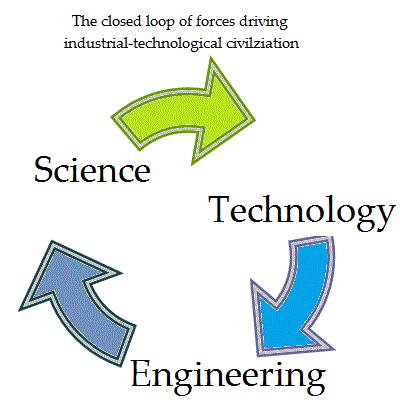Industrial-Technological Disruption
26 November 2012
Monday
In The Industrial-Technological Thesis I characterized industrial-technological civilization as involving an escalating cycle of science, technology, and engineering, each generation of which feeds into the next so that science makes new technologies possible, new technologies are engineered into new industries, and new industries create the instruments for further scientific research. I further argued in Civilization, War, and Industrial Technology that the only property more pervasively inherent in industrial-technological civilization than escalating feedback is war — since escalating feedback is characteristic only of The Industrial-Technological Thesis, whereas war typifies all civilization. Thus technological growth and war are both structurally inherent in The Industrial-Technological Thesis, so much so that to entertain the idea of civilization without either is probably folly.
Now I realize that in recounting the escalating spiral of science, technology and engineering, that I was recounting only the “creative” side of the “creative destruction” of industrialized capitalism, and that the creative destruction of capitalism as it is played out in industrial-technological civilization also has a destructive side that is expressed in a way entirely consonant with the distinctive character of industrial-technological civilization. Each phase in the cycle of science, technology, and engineering fails in a distinctive (and in a distinctively interesting) way.
The counter-cyclical trend to that of the exponentially escalating spiral of science, technology, and engineering is the exponentially deescalating downward trend of science in model crisis, stalled technology, and catastrophic failures of engineering. Science falters when model drift gives way to model crisis and normal science begins to give way to revolutionary science. Human beings, being what they are, have invested science with the “truth” once reserved for matter theological; but science has no “truths” — there is only the scientific method, which remains the same even while the knowledge that this method yields is always subject to change. Technology falters when its exponential growth tapers off and its attains a mature plateau, after which time it changes little and becomes a stalled technology. Engineering falters when industries experience the inevitable industrial accidents, intrinsic to the very fabric of industrialized society, or even experience the catastrophic failures to which complex systems are vulnerable.
I hadn’t previously thought of these disruptions to industrial-technological civilization together, but now that I see them whole I see that I have already written separately about all the phases of failure that so closely parallel the successes of industrialization. Mostly, I think, these disruptions have taken place separately, and have therefore only proved to be temporary disruptions in the rapidly-resuming cycle of technological growth. However, once we see the possible failures as a systemic, counter-cyclical trend that destroys old knowledge, old technology, and old industries in order to make room for the new, we can easily see the possibility of an escalating disruption in which scientific model crisis would limit knowledge, limited knowledge would lead to long term stalled technologies, and stalled technologies would lead to escalating industrial accidents and complex catastrophic failures.
None of this, of course, is in the least bit surprising. Ever since the industrialized warfare of the twentieth century we have been discussing the possibility that industrial-technological civilization will more or less inevitably destroy itself. Civilization, when it was suddenly and unexpectedly preempted by industrialization, has opened Pandora’s box, and the evils that fly free cannot be shut back inside.
. . . . .
. . . . .
. . . . .








